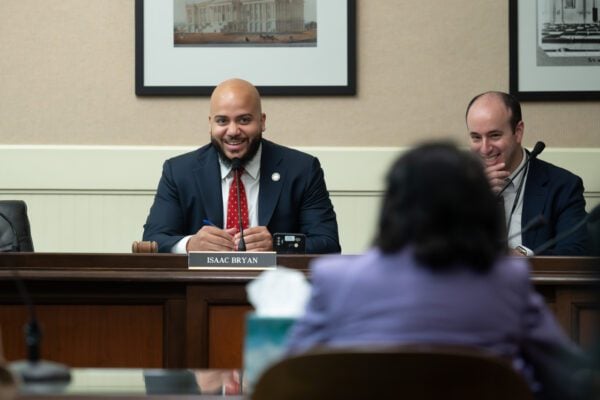
By Joe W. Bowers Jr., California Black Media
At 32, Isaac Bryan (D-Ladera Heights) has emerged as one of California’s most dynamic Assemblymembers.
As a former Assembly Majority Leader, Bryan has focused his legislative career on addressing racial inequities and systemic injustice, particularly in criminal justice reform, environmental justice, and economic equality.
Now in his fourth year in the legislature, Bryan serves as a generational bridge within the California Legislative Black Caucus (CLBC) as several longer-serving colleagues have left office due to term limits. In 2025, he will assume the influential role of CLBC Vice Chair and is expected to provide greater leadership on issues important to Black Californians.
Representing the 55th Assembly District, which includes both affluent and disadvantaged communities in Los Angeles County, Bryan’s legislative efforts have been crucial in passing policies that uplift marginalized communities, particularly Black Californians, while addressing long-standing systemic inequities.
Recently, Bryan spoke with California Black Media (CBM). He reflected on his legislative efforts in 2024, the challenges he faced, and his vision for 2025.
His responses have been edited for length and clarity.
Reflecting on 2024, what do you believe was your most impactful achievement for advancing the interests of Black Californians, and why?
The first is AB 2716. It is a major win for environmental justice that addresses long-standing health and safety concerns for Black and lower-income residents living near oil and gas production fields. The second is AB 2906. That bill ensures that foster care children, many of whom are disproportionately Black, receive their rightful survivor benefits from federal programs after their parents pass away. Previously, these funds were often redirected to county budgets. AB 2906 is a real game-changer for foster care youth. We’ve ensured that these kids, who’ve already faced so many obstacles, are not cheated out of the financial support meant for them.
As the incoming Vice Chair of the Black Caucus, how have your leadership and policy efforts helped address key issues impacting Black Californians?
Leadership is about bringing people together across racial, geographic, and political lines to make meaningful change. The Black Caucus secured $300 million in ongoing funding for California’s lowest-performing students, who are disproportionately Black. We fought hard for this funding, and it’s going to make a real difference in our communities, helping to close the achievement gap.
What were the most significant challenges you faced in advocating for Black Californians, especially in navigating the complexities of reparations discussions and other policies aimed at addressing systemic inequities?
Misinformation and disinformation were huge obstacles in 2024, especially during an election year. These tactics have been used to divide Black communities and diminish their political influence. Another major challenge was navigating the state’s budget deficit, which threatened critical programs for Black Californians. We had to fight hard to protect programs in education, housing, and social services from severe cuts. When you’re dealing with a budget deficit, every dollar counts, and we had to ensure that our communities weren’t the ones left shortchanged.
What events or movements inspired you the most in your efforts to support Black communities?
Watching grassroots organizations and everyday people stand up for their communities, especially when it comes to health and safety, has been powerful. It’s inspiring to see local advocates and community members not only speak up, but demand the right to live in safe, healthy environments.
What lessons from 2024 have shaped your approach to policy and decision-making?
The biggest lesson from 2024 is the importance of persistence. As leaders, we have to stay committed to the long game, even when the path is difficult. The fight for equity, whether it’s in housing, education, or environmental justice, requires consistency. You can’t let up.
In one word, what do you see as the most pressing issue Black Californians are facing?
Equity. We need to make sure that Black Californians are not left behind as we move forward as a state. This means pushing to repair past harms and fighting for fair access to resources and opportunities in every aspect of life, whether it’s education, jobs, or health.
What is the one goal you are most committed to achieving in 2025 as Vice Chair of the Black Caucus?
My number one goal for 2025 is to ensure that the state’s budget is not balanced on the backs of Black Californians. The budget is a moral document, and it needs to reflect our values of fairness and justice.


